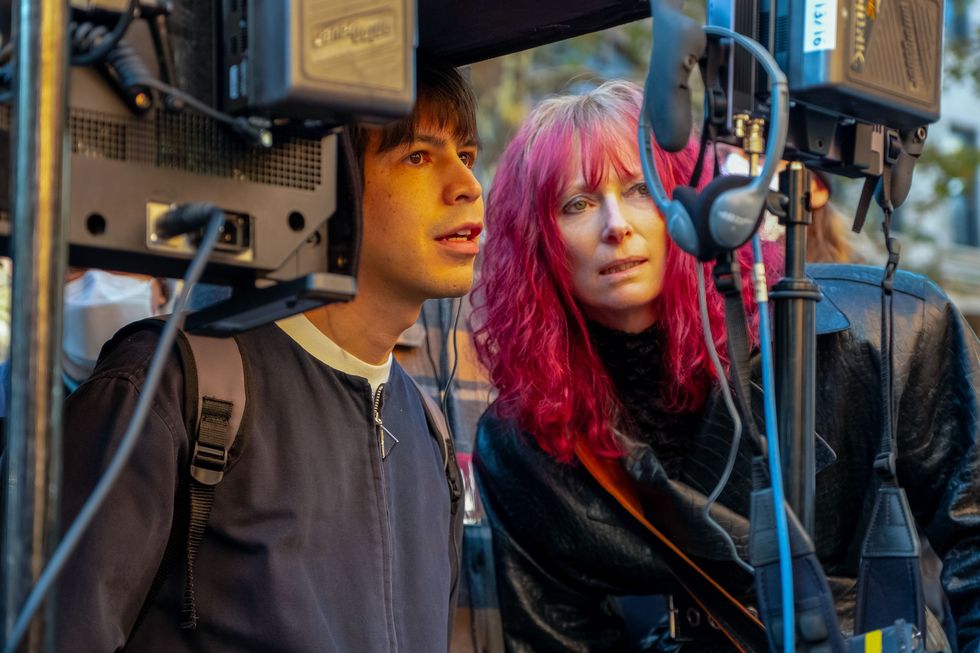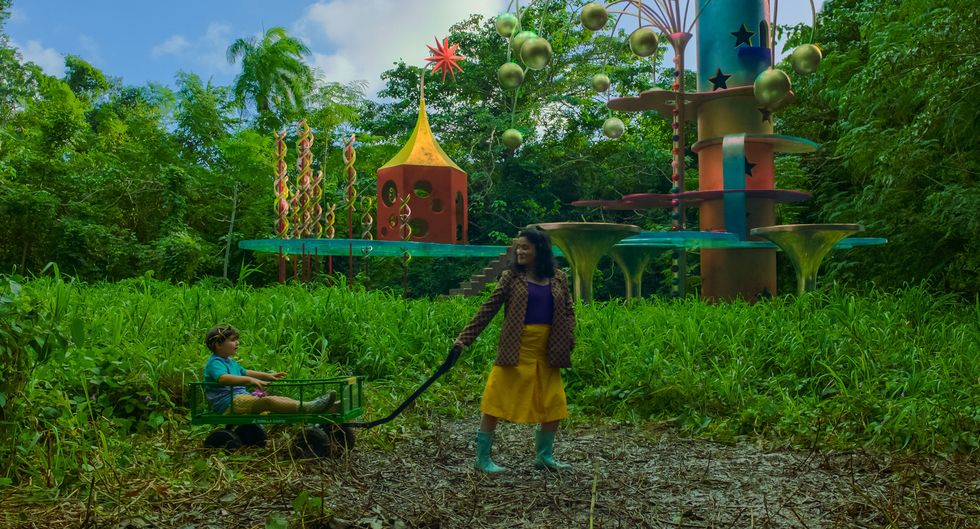In Problemista, Julio Torres Looks at the Absurdity of the Immigration Process
In Problemista, the film he wrote, directed, and stars in, Julio Torres plays a character a bit like himself. Like Torres, Alejandro leaves behind his loving family in Latin America to come to the U.S. to fulfill his creative dreams. The story that follows is a bit of a departure from the immigration stories we’ve seen. Alejandro is physically safe and remains housed, though not securely. He remains trapped, though, in an endless and counterintuitive cycle. After losing his job he must find another one with an employer willing to sponsor him for a visa. He must find it quickly, as if he doesn’t within a month he will be deported, and until he does, he cannot earn money, though the whole process involves very expensive fees.
Torres, 37, has experienced similar ordeals since moving from El Salvador to New York for school. Over years spent doing stand-up comedy, working as a writer for Saturday Night Live, and creating and starring in the HBO series Los Espookys, writing about his experience was something he’d always wanted to do. It took a certain degree of growth for him to be ready to do it the right way.
“It wasn’t until I understood myself better as a person that I was able to write a movie that wasn’t just a movie about perseverance, but a movie about a very specific person who is facing [something]. We all have different cards that are dealt to us, and this immigration thing is a card that was dealt to me at this level. But I think I had to understand my proclivity to surviving problems and my attraction to problems and my attraction to difficulty to really understand that this movie was about someone who felt like he needed a challenge and not so much someone who just had a hard time and had to overcome,” he says.
Torres spoke with ELLE.com about his own experience and the way that the U.S. is responding to immigration.
What made you feel like this was the right time to do something somewhat autobiographical?
I think that when you’ve gone through a period that was hard, it takes a while to look back on it and have the self-awareness to be like, did it have to be that hard? Did I make it hard? Or why was it that hard? Maybe life isn’t just happening to me, maybe I’m actually a participant in my life.
When you talk about your attraction to difficulty, how is that manifested?
I think that most artists have that. Choosing the path that we choose is, on a certain level, choosing the hardest path available. But I think that I’ve learned that my work really sings coming from just being fixated on problems. I think that immigration is a problem and for me, what that looked like was bureaucratic, as opposed to the physical adversity that is the really, really set reality for most immigrants from Latin America.
For me, it just felt like being stuck in this paperwork maze, which is sort of the silent reality of many people that come to this country. I think that that feeling of being a lab rat in a maze isn’t just an immigration thing. We all know people who get sick and their insurance doesn’t cover it and they have to call someone else and then it becomes like oh, so you’re not just sick, now your full-time job is this thing.
Or in other cases, people go into debt trying to go to school and then it’s trying to cobble together a living [with] that. We’re all trapped in these systems to varying degrees. Some people just have the means of flying through, some of us in the middle can make it work, and [for] some of us there’s no boot[straps] to pull up.
I’m very keen on showing the humanity of the people trapped in the maze. Something that I really try to lean on in this movie, where even though Alejandro is the protagonist and is very clear on what his maze is, Elizabeth, Tilda Swinton’s character, is also in her own journey. Her husband Bob [played by RZA] is also in his own journey. He’s also an artist and he’s also attracted to challenges and Alejandro’s mom is also an artist. I was very, very compelled to show New York City as a city of people going through problems. Whether they broadcast them or not, they’re all going through their own private little hells.
I thought it really viscerally showed just the frustration of immigration. Even people who think that they are familiar with this situation realize how aggravating it is on a day-to-day basis and the hoops you have to go through. It’s interesting that it’s coming out at a time when the situation with immigration in New York is a crisis and no one knows what to do.
The frustrating thing is that it’s not so much that no one knows what to do, it’s that there’s not a willingness to be human. It’s the same things that we’re seeing over and over again, where there are certain things that the government puts money for and there are certain things where they’re like, no, actually, we can’t do that. You’re tapping people within this system that is not ordained by God, it’s not divine. It’s at the hands of the people.
I was thinking the other day of how, say you download an app on your phone. If the app is clunky and it’s hard to use and you have a very difficult time using it, whatever company gets that feedback and then they improve it. Because they want your money. Because it’s in their best financial interest for their stuff to be easy to use. But governments don’t see helping the poor as something that is beneficial to them, so there is actually no interest in fixing the system because of this flawed idea that helping people is not a duty but it’s charity that they can do if they want to or not.
It’s crazy how New York City, one of the richest cities in the world, in the richest country on Earth, whose whole branding is immigration, doesn’t have the willingness to fix this. It’s heartbreaking.
It is. There’s such cruelty. It’s an issue that you see when you walk through the streets and I just think there’s an unwillingness to deal with it or to understand it or to connect with people that’s just really sad.
It’s also this idea of the other, right? “They’re not New Yorkers.” It’s that divide that we pretend isn’t there is there and it’s felt. We are trained to frankly pixelate displaced people. I feel like we all need to tap into our empathy and be like, no, that’s not actually a blurry face over there.
And remember that where you’re born is luck. It’s not an achievement to be born here; we didn’t earn it. The kind of self-determination we encourage in America, doing the best thing for your kid, we then demonize. Have you found that people who have seen the movie that have maybe been in similar situations are able to connect with it?
I definitely have a lot of people who have felt seen by it or who have felt like they had their experience articulated. It’s people who have gone through immigration problems of an easier degree, a harder degree, an equal degree. But also, [there are] people who have not dealt with immigration in any way shape or form who have felt what it’s like to be trapped in a maze like that. Having people think about these things, or maybe even someone who has never gone through anything like that, go back and revisit and try to imagine what it’s like to go through something is, as an artist, the highest mission.
We talk a lot about representation. Now it feels like it’s gone into a marketing trend. I think as artists we have to keep reminding ourselves that representation shouldn’t just be cosmetic, shouldn’t just be faces on a poster. As helpful as faces on a poster can be, the work should ideally encourage empathy and thinking that make it so having those faces on a poster isn’t an achievement unto itself.
The movie exists in itself as something so beautiful and funny, but do you hope it sparks a certain kind of conversation?
I really, really hope that it encourages people to look around them and think about other people. A lot of the messaging in Hollywood for the longest time has been work really hard and your dream will come true. I have worked and Alejandro, my character, did work really hard but I feel like the new message that we should convey is that you don’t know what other people are going through. If you see someone having a hard time, help them.
This interview has been edited and condensed.




